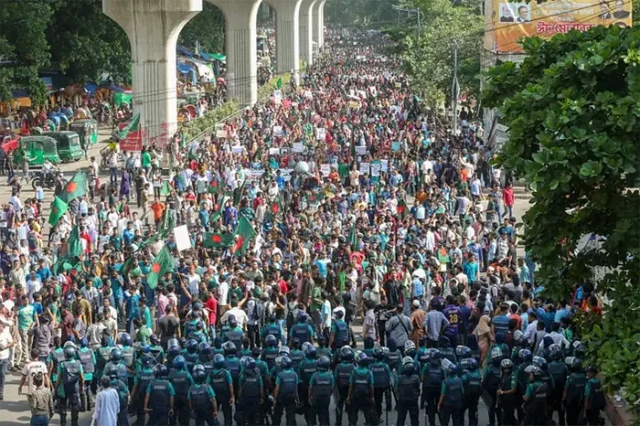In a report by Nikkei Asia, it is highlighted that critics are leveraging foreign remittances as a new tool to support the ongoing severe protests in Bangladesh, which have persisted for weeks. They describe the violence as state-imposed. Organizers of this initiative are urging nearly 10 million Bangladeshis living abroad to halt remittances to their home country. These expatriates send approximately $2 billion in remittances each month. Amid the economic crisis, the government sought loans from the IMF last year, prompting expatriates to take this action. Remittances are the second-largest source of foreign currency for South Asia’s Bangladesh.
One of the organizers, Foyez Ahmed Tayeb, an engineer at a telecom company in Europe, said, “We can cut the economic lifeline of this authoritarian government by reducing remittances.” This initiative is supported by several well-known Bangladeshi expatriates, including a journalist residing in the United States, who has previously worked for a television station and is a strong critic of the ruling government with at least 2 million followers on YouTube.
Unemployment among youths in the country is skyrocketing. Students and other protesters have called for reform in the job quota system. Last month, protests escalated, leading to the death of at least 200 people and causing widespread unrest. The government has cracked down hard on the protesters, drawing intense criticism both domestically and internationally. Thousands have been arrested. Prime Minister Sheikh Hasina’s government, re-elected for a fourth consecutive term this year amid opposition boycotts, has blamed Jamaat-e-Islami for the violence and banned them and their student wing. Notably, the quota system in jobs was abolished in 2018 following intense protests, but the High Court ordered its reinstatement in June. Despite the government’s agreement to reduce the quota, curfews persisted, and public anger remained high.
On Wednesday, the European Union sharply criticized Dhaka’s handling of the unrest and subsequently suspended new cooperation agreements on trade and economic relations with Bangladesh. Two years ago, Bangladesh’s reserves fell from about $49 billion to $18 billion, exacerbating the foreign reserve crisis. Last year, remittances from expatriates amounted to approximately $24 billion, providing significant tax revenue to the government. Shafkat Rabbi, an adjunct instructor of business analytics at Dhaka University, compared remittances for Bangladesh to oil sales for Middle Eastern countries, warning that a decline in remittances could create a disastrous economic situation for Bangladesh.
Another leader of the boycott movement, Saddam Hossain, a Tokyo-based apparel merchandiser, has urged Bangladeshis in Japan and South Korea to temporarily stop sending money home despite the economic crisis. He said, “I am doing this for my motherland. This authoritarian government has lost all legitimacy by killing students.”
However, Selim Mahmud, the information and research secretary of the ruling Awami League, described the remittance boycott as treasonous and impractical in the long term. He told Nikkei Asia, “Relatives in the country rely on this money. By calling to avoid legal channels, they are encouraging illegal means,” alluding to informal channels for remittances. The social media campaign has prompted top government ministers to urge expatriates to continue sending money. Some banks have raised the value of the dollar to increase remittance inflows. Business leaders have already warned that the recent protests, curfews, and government-imposed internet shutdowns have caused nearly $1 billion in economic damage, threatening Bangladesh’s reputation as an investment destination.
It is currently unclear how many expatriates are participating in the remittance boycott and how much remittance might decrease. According to a report from Bangladesh Bank, only $78 million in remittances were received from July 19 to July 24, equivalent to the amount usually received in one day. Bangladesh Bank spokesperson Mezbah Ul Haq suggested that the five-day internet shutdown during the protests might have caused the sharp decline in remittances. Australia-based economist Jyoti Rahman stated it is too early to say whether the decline is due to the boycott. However, if even a fraction of remittance senders participate, it could mean less foreign exchange and downward pressure on the local currency. If remittances are halved, Bangladesh will face insolvency, with the local currency likely to crash, according to US-based academic Rabbi.
In a report by Nikkei Asia, it is highlighted that critics are leveraging foreign remittances as a new tool to support the ongoing severe protests in Bangladesh, which have persisted for weeks. They describe the violence as state-imposed. Organizers of this initiative are urging nearly 10 million Bangladeshis living abroad to halt remittances to their…
Javed Akhtar, president of the Foreign Investors Chamber of Commerce and Industry, warned of economic repercussions, stating, “The economic impact is just beginning. If the protests continue, the total damage could be greater. However, if the government quashes the movement, the remittance boycott could backfire.”
Javed Akhtar, president of the Foreign Investors Chamber of Commerce and Industry, warned of economic repercussions, stating, “The economic impact is just beginning. If the protests continue, the total damage could be greater. However, if the government quashes the movement, the remittance boycott could backfire.” Dhaka-based economist Rubaiyat Sarwar noted the complexity of the current situation, stating that the government could use the conflict between low-income people and students as a tool to escalate tensions.










